一般过去时(2)
新外研版六年级英语下册Module 6 Unit 2 --一般过去时讲解二
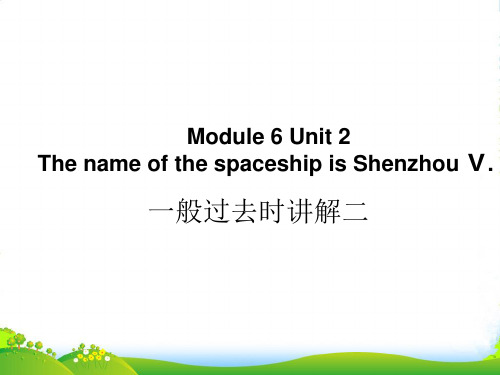
一般疑问句: Did they have a good time in the park?
肯定/否定回答: Yes, they did. No, they didn’t.
2. Ann did her homework yesterday evening.
•不习惯读书进修的人,常会自满于现状,觉得再没有什么事情需要学习,于是他们不进则退。经验丰富的人读书用两只眼睛,一只眼睛看到纸面上的话,另 一眼睛看到纸的背面。2022年4月3日星期日2022/4/32022/4/32022/4/3 •书籍是屹立在时间的汪洋大海中的灯塔。2022年4月2022/4/32022/4/32022/4/34/3/2022 •正确的略读可使人用很少的时间接触大量的文献,并挑选出有意义的部分。2022/4/32022/4/3April 3, 2022 •书籍是屹立在时间的汪洋大海中的灯塔。
谢谢观赏
You made my day!
我们,还在路上……
Module 6 Unit 2 The name of the spaceship is Shenzhou Ⅴ.
一般过去时讲解二
past now
future
一般过去时 肯定句变否定句
be动词类 •过去存在的状态 的句子中在was, were的后面加上not。
肯定/否定回答: Yes, I did. No, I didn’t.
4. My brother was in the park just now.
• 一般疑问句: • Was your brother in the park just now?
肯定/否定回答: Yes, he was. No, he wasn’t.
英语专项 语法 时态 2 一般过去时 讲解+练习+答案 simple past
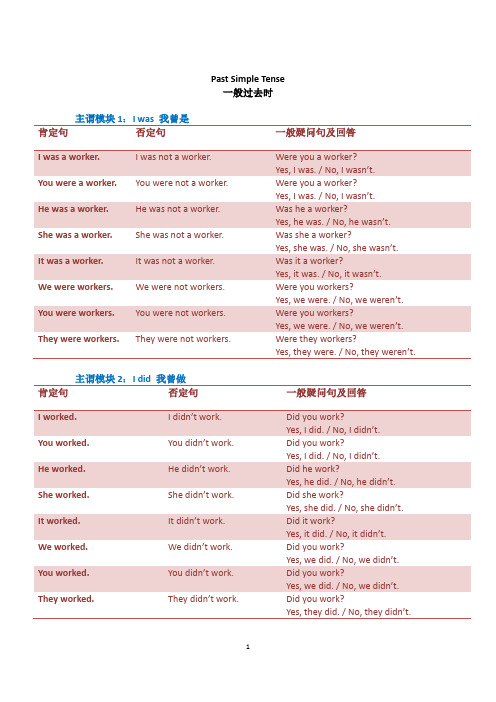
Past Simple Tense一般过去时主谓模块1:I was 我曾是肯定句否定句一般疑问句及回答Yes, I was. / No, I wasn’t.He was a worker. He was not a worker. Was he a worker?Yes, he was. / No, he was n’t. She was a worker. She was not a worker. Was she a worker?Yes, she was. / No, she was n’t.It was a worker. It was not a worker. Was it a worker?Yes, it was. / No, it was n’t.We were workers. We were not workers. Were you workers?Yes, we were. / No, we were n’t. You were workers. You were not workers. Were you workers?Yes, we were. / No, we were n’t. They were workers. They were not workers. Were they workers?Yes, they were. / No, they were n’t.主谓模块2:I did 我曾做肯定句否定句一般疑问句及回答Yes, I did. / No, I did n’t.He worked. He did n’t work.Did he work?Yes, he did. / No, he did n’t. She worked. She did n’t work. Did she work?Yes, she did. / No, she did n’t. It worked. It did n’t work. Did it work?Yes, it did. / No, it did n’t.We worked. We did n’t work. Did you work?Yes, we did. / No, we did n’t. You worked. You did n’t work.Did you work?Yes, we did. / No, we did n’t. They worked. They did n’t work.Did you work?Yes, they did. / No, they did n’t.标准句子结构●主谓模块1+X+时间模块I was a worker then. 那时我还是一个员工。
【英语】过去将来时一般过去时知识点总结(2)

【英语】过去将来时一般过去时知识点总结(2)一、过去将来时1.When we were boys we swimming every summer.A. goB. would goC. wentD. goes【答案】B【解析】【分析】句意:小时候,每到夏天我们都要去游泳。
When引导时间状语从句,从句用一般过去时,主句用过去将来时,would+动词原形,表示过去习惯性的动作。
故选B。
【点评】考查would+动词原形表习惯性动作。
2.—What did your son say in the letter?—He told me that he __________ the Great Wall the next day.A. will visitB. has visitedC. is going to visitD. would visit【答案】 D【解析】【分析】句意:你的儿子在信中说什么?他告诉我他第二天要去参观长城.结合语境可知从句描述的是站在过去角度看将来发生的动作,故用过去将来时态,故选D.【点评】英语中的时态主要是借助于时间状语与上下文语境来进行判断。
解答此类题型,首先要注意句子中的时间状语,如果没有则要通过分析上下文,结合语境来判断句子的时态。
英语疑问句中一般具有时态上的对应关系,注意结合这一特点进行区分。
3.Mr. Wu said he ______ us to the zoo the next week.A. would takeB. will takeC. takeD. takes【答案】 A【解析】【分析】句意:吴老师说他下周会带我们去动物园。
在这个句子中,said 后面跟的是一个宾语从句,从句中的时态是由主句决定的。
主句中said 用的是过去时,故宾语从句中也需用过去时态。
the next week 下周,是一个将来的时间。
故应该用过去将来时。
故选A。
【点评】考查动词时态。
A3-八年级上册英语-一般过去时(2)和阅读理解(1)

课程名称
学生姓名___________学科_________年级_____________
教师姓名___________平台_________上课时间_____________
1.通过对对be动词的一般过去时句子结构和实义动词的一般过去时句子结构进行类比,理解实义动词的一
般过去时句子结构
2.通过对学生的动觉刺激,促进学生对一般过去时的句子结构的有效记忆
3.通过动觉类比法,引导学生建构学科知识体系,激发解决相关问题的潜能
(25分钟)
回顾旧知识
注:最少保留两个任务
(通过老师引导,学生写出新知识)
注:可根据以下思路引导:1.相似与不同;2.易错点。
(15分钟)
考点:(学生写出本题的考点) ________________________________________________________
考点:(学生写出本题的考点)
____________________________
____________________________
至少2个例题
(15分钟)
练习题与例题知识点内容、难度、题型匹配。
至少2个习题
(5分钟)手写板,每个不少于3行
(20分钟)
注:
1.原则上,所有知识点均需用类比模板呈现,如遇到不易用类比关系讲解的知识,可用对比关系模板;
2.用类比关系讲解出新知识,新知识顺带的知识点可以直接呈现。
答案
记忆再现 1. AAABB 2.ACBDA
追踪演练例1 CACAC 例2 DCCB
自我提升DDABC ADB。
一般过去时专项一(2)
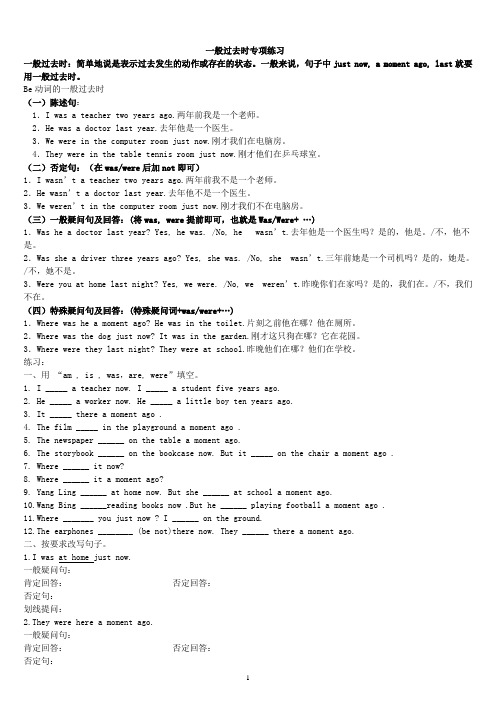
一般过去时专项练习一般过去时:简单地说是表示过去发生的动作或存在的状态。
一般来说,句子中just now, a moment ago, last就要用一般过去时。
Be动词的一般过去时(一)陈述句:1.I was a teacher two years ago.两年前我是一个老师。
2.He was a doctor last year.去年他是一个医生。
3.We were in the computer room just now.刚才我们在电脑房。
4.They were in the table tennis room just now.刚才他们在乒乓球室。
(二)否定句:(在was/were后加not即可)1.I wasn’t a teacher two years ago.两年前我不是一个老师。
2.He wasn’t a doctor last year.去年他不是一个医生。
3.We weren’t in the computer room just now.刚才我们不在电脑房。
(三)一般疑问句及回答:(将was, were提前即可,也就是Was/Were+ …)1.Was he a doctor last year? Yes, he was. /No, he wasn’t.去年他是一个医生吗?是的,他是。
/不,他不是。
2.Was she a driver three years ago? Yes, she was. /No, she wasn’t.三年前她是一个司机吗?是的,她是。
/不,她不是。
3.Were you at home last night? Yes, we were. /No, we weren’t.昨晚你们在家吗?是的,我们在。
/不,我们不在。
(四)特殊疑问句及回答:(特殊疑问词+was/were+…)1.Where was he a moment ago? He was in the toilet.片刻之前他在哪?他在厕所。
2.英语时态(2)过去
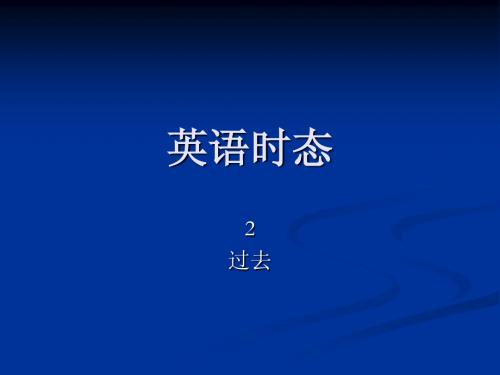
4.否定形式: was/were+not;在行为动词前加didn't,同时还原行 为动词。 5.一般疑问句: was或were放于句首;用助动词do的过去式did 提 问,同时还原行为动词。 6.例句: She often came to help us in those days. I didn't know you were so busy.
在含有时间状语从句的复合句中,延续时间较长的动作用 过去进行时,另一个动作用一般过去时。如果表示两个延 续动作在过去某一时刻同时进行,而不考虑动作的先后长 短,则主句和从句的谓语动词都用过去进行时。 My pen dropped on the ground when I was walking in the park. 我在公园散步的时候,我的钢笔掉到地上了。 When I entered the room, she was sitting at her desk.我进屋的 时候,她正坐在书桌前面。 The students were reading while the teacher was grading their homework.学生们在看书,而老师在批改他们的家庭作业。
2. 表示过去连续发生的动作时,要用过 去时
这种情况下,往往没有表示过去的时 间状语,而通过上下代来表示。 The boy opened his eyes for a moment, looked at the captain,and then died. 那男孩把眼睛张开了一会儿,看看船 长,然后就去世了。
(2)表示过去某段时间正在进行的动作。 Shirley was writing a book about China last year but I don't know whether she has finished it.舍 利去年在写一本有关中国的书,但我不知 道他是否完成。 They were building a dam last winter.去年冬天 他们在建大坝。 I was living in my teacher's house when I was in middle school.上中学时,我住在老师家里。
(完整)英语一般过去时语法知识归纳总结(2),推荐文档

一般过去时语法知识一般过去时表示过去某个时间发生的动作或状态;过去习惯性、经常性的动作、行为;主语在过去时间段所具备的能力和性格。
一般过去时句子最明显的现象就是常由表达过去时间的副词、副词短语或从句来界定。
“过去”的概念并不仅指如“yesterday, last week,……”等,实际上...“.非现在......“.与现在对立的过去........”.,亦即的以前..”.形成对立,就必...............“.现在...........“.过了说话时间的几分钟之前............”.,只要所要表达的时间与说话时的...”.,哪怕是须使用一般过去时来表达。
............例如:He was here only a few minutes ago. 仅仅几分钟前他还在这里。
I came home just now. 我刚回到家。
“this + 时间,today”等时间副词常用于修饰一般现在时,但是只要..........”.对立,..句子的本意是......“.与说话时的现在即使句子中有..必须使用一般过去时。
..........例如:......“.th..i.s. + .时间,....,也.....”.等.时间副词...todayI got up very early this morning. 今天早晨我起床很早。
He was late for school again today. 今天他又迟到了。
强化理解:1. 一般过去时表示在过去某个特定时刻或时期所发生的事情,也可以表示过去习惯性、经常性的动作。
一般过去时只说明过去的事情...........。
..............,.不强调动作对现在的影响I had a word with Julia this morning. 今天早晨,我跟朱丽亚说了几句话。
He smoked many cigarettes a day until he gave up. 他没有戒烟的那阵子,抽烟抽得可凶了。
(完整版)小学英语一般过去时习题及答案 (2)

用括号内所给词的适当形式填空1. We _________ (enjoy) ourselves at the party last night.2.Jack ____________ (study) for the English test last Sunday.3._______ you ______ (go) to the Great Wall last year?4.The old man _______(be)ill and went to see a doctor.5.We ________ (have) a party last night.6.We __________ (visit) the museum and went home.7.— How _______ (be) the students? — They were very friendly.8.He often _______ (eat) dinner at home. Today he ______ (eat) dinner at school.9.— ______ he _______ (have) lunch at nine? — No, he didn’t.10.They _________(buy) a piano yesterday.11.What __________ (make) him cry (哭) just now?st year the teacher ___________ (tell) us that the earth moves around the sun.练习二用所给动词的适当形式填空1.Tom and Mary ___________ (come) to China last month.2.Mike __________(not go) to bed until 12 o’clock last night.3.Mary __________ (read) English yesterday morning.4.There _________ (be) no one here a moment ago.5.I ___________ (call) Mike this morning.6.I listened but ___________ (hear) nothing.7.Tom ___________ (begin) to learn Chinese last year.st week we _________ (pick) many apples on the farm.9.My mother ________________ (not do) housework yesterday.10.She watches TV every evening. But she _______________ (not watch) TV last night.11.________ your father ________ ( go ) to work every day last year?12. When ______ you ____(get) to Beijing yesterday? We _____(get) to Beijing at 9:001. He came here last month. (改为否定句) He _______ _______ here last month.2.They played football this morning. (改为一般疑问句并作简略回答)—_____ they _____ football this morning? —Yes, they _______./No, they ______ .3.They went to Beijing last year. (就划线部分提问)_________ _________ they ________ last year.4.Tom watched TV last night. (改为一般疑问句) _______ Tom _______ TV last night?5.Mary does homework every day. (用last night 改写句子)Mary ________ ____________ _________ ________ .6. He’s cleaning his rooms. (划线提问)______ ______he _______?7. My family went to the beach last week. (划线提问)________ ________ ________ family _______ last week?按要求变换句型。
语法部分(二)一般过去时
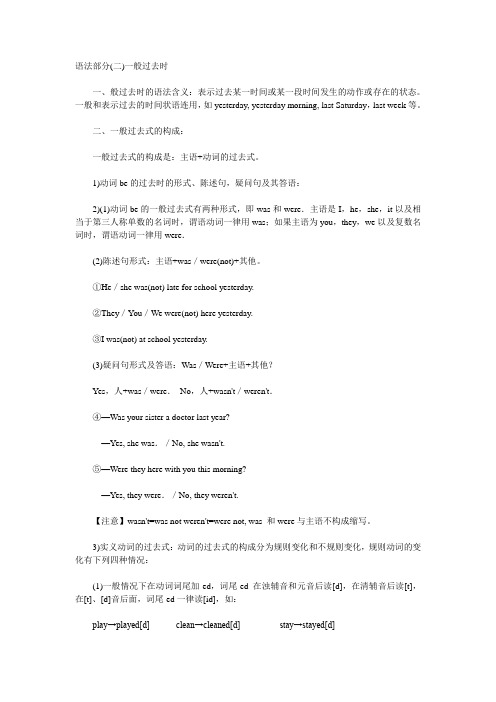
语法部分(二)一般过去时一、般过去时的语法含义:表示过去某一时间或某一段时间发生的动作或存在的状态。
一般和表示过去的时间状语连用,如yesterday, yesterday morning, last Saturday,last week等。
二、一般过去式的构成:一般过去式的构成是:主语+动词的过去式。
1)动词be的过去时的形式、陈述句,疑问句及其答语:2)(1)动词be的一般过去式有两种形式,即was和were.主语是I,he,she,it以及相当于第三人称单数的名词时,谓语动词一律用was;如果主语为you,they,we以及复数名词时,谓语动词一律用were.(2)陈述句形式:主语+was/were(not)+其他。
①He/she was(not) late for school yesterday.②They/You/We were(not) here yesterday.③I was(not) at school yesterday.(3)疑问句形式及答语:Was/Were+主语+其他?Yes,人+was/were.No,人+wasn't/weren't.④—Was your sister a doctor last year?—Yes, she was./No, she wasn't.⑤—Were they here with you this morning?—Yes, they were./No, they weren't.【注意】wasn't=was not weren't=were not, was 和were与主语不构成缩写。
3)实义动词的过去式:动词的过去式的构成分为规则变化和不规则变化,规则动词的变化有下列四种情况:(1)一般情况下在动词词尾加-ed,词尾-ed在浊辅音和元音后读[d],在清辅音后读[t],在[t]、[d]音后面,词尾-ed一律读[id],如:play→played[d]clean→cleaned[d] stay→stayed[d]ask→asked [t] cook→cooked [t] watch→watched[t]need→needed[id]want→wa nted[id] visit→visited[id](2)词尾是e的动词加-d。
一般过去时2
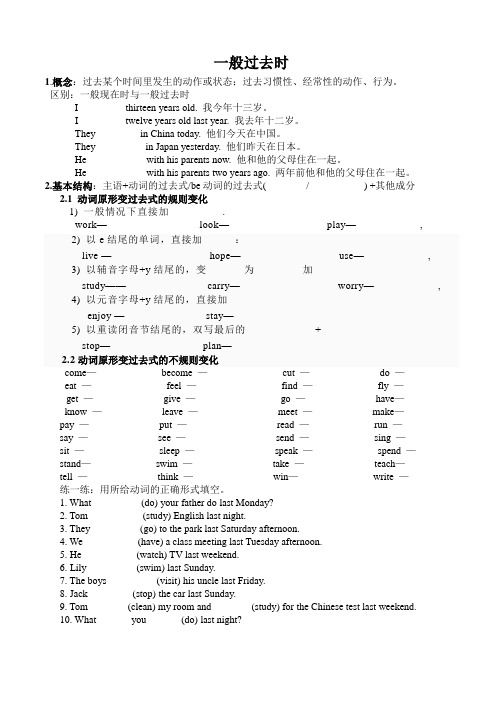
一般过去时1.概念:过去某个时间里发生的动作或状态;过去习惯性、经常性的动作、行为。
区别:一般现在时与一般过去时I_________ thirteen years old. 我今年十三岁。
I_________ twelve years old last year. 我去年十二岁。
They ________ in China today. 他们今天在中国。
They _________ in Japan yesterday. 他们昨天在日本。
He ___________ with his parents now. 他和他的父母住在一起。
He ___________ with his parents two years ago. 两年前他和他的父母住在一起。
2.基本结构:主语+动词的过去式/be动词的过去式(________/___________) +其他成分2.1 动词原形变过去式的规则变化1) 一般情况下直接加__________.work—___________ look—____________ play—____________,2) 以e结尾的单词,直接加______:live —___________ hope—___________ use—____________,3) 以辅音字母+y结尾的,变_______为_________加_________study——__________ carry—____________ worry—____________,4) 以元音字母+y结尾的,直接加________enjoy —__________ stay—_____________5) 以重读闭音节结尾的,双写最后的_____________+_______stop—___________ plan—___________2.2动词原形变过去式的不规则变化come—_________ become —___________ cut —__________ do —_________ eat —__________ feel —_____________ find —________ fly —_________ get —_________ give —____________ go —__________ have—________ know —_______ leave —___________ meet —_________ make—_________ pay —___________ put —_____________ read —_________ run —_________ say —__________ see —_____________ send —_________ sing —__________ sit —__________ sleep —___________ speak —_________ spend —________ stand—_________ swim —____________ take —__________ teach—________ tell —__________ think —____________ win—___________ write —_________ 练一练:用所给动词的正确形式填空。
Unit 6 一般过去时(2)重点语法提升练-2022-2023学年七年级英语下册
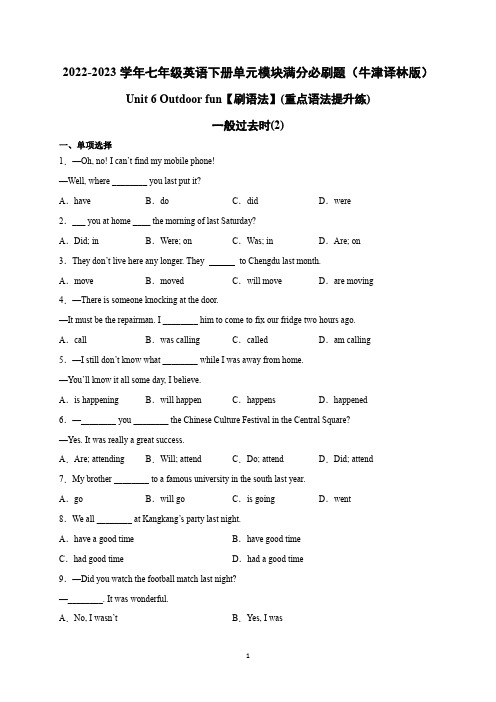
2022-2023学年七年级英语下册单元模块满分必刷题(牛津译林版)Unit 6 Outdoor fun【刷语法】(重点语法提升练)一般过去时(2)一、单项选择1.—Oh, no! I can’t find my mobile phone!—Well, where ________ you last put it?A.have B.do C.did D.were2.___ you at home ____ the morning of last Saturday?A.Did; in B.Were; on C.Was; in D.Are; on3.They don’t live here any longer. They to Chengdu last month.A.move B.moved C.will move D.are moving4.—There is someone knocking at the door.—It must be the repairman. I ________ him to come to fix our fridge two hours ago.A.call B.was calling C.called D.am calling5.—I still don’t know what ________ while I was away from home.—You’ll know it all some day, I believe.A.is happening B.will happen C.happens D.happened6.—________ you ________ the Chinese Culture Festival in the Central Square?—Yes. It was really a great success.A.Are; attending B.Will; attend C.Do; attend D.Did; attend7.My brother ________ to a famous university in the south last year.A.go B.will go C.is going D.went8.We all ________ at Kangkang’s party last night.A.have a good time B.have good timeC.had good time D.had a good time9.—Did you watch the football match last night?—________. It was wonderful.A.No, I wasn’t B.Yes, I wasC.No, I didn’t D.Yes, I did10.—Were you born in Beijing?—________. I was born in Shanghai.A.Yes, I am B.No, I’m not C.Yes, I was D.No, I wasn’t 11.—I called you this morning, but you were not in.—Sorry, I ________ in the supermarket with my mother.A.am B.was C.will be D.be 12.—Daniel, ________ you afraid when you heard the whisper behind the wall?—No, I ________ feel afraid because my best friend Nick was with me.A.were; wasn’t B.were; didn’t C.did; wasn’t D.did; didn’t 13.—Did they visit the high school?—_________. They said it was great.A.Yes, they do B.No, they didn’t C.Yes, they did D.No, they don’t 14.—Hi, Carol. How was your trip to Disneyland?—Hi, Alice. Oh, we _________a good time there.A.are having B.to have C.have D.had 15.—Who cleaned the classroom?—Bob ________.A.does B.did C.cleaned D.was 16.—Excuse me, you can’t take photos in the museum. It says “No Photos!”—Sorry, I _________ it.A.don’t see B.won’t see C.didn’t see D.wasn’t seeing 17.I ________ anything because they were so expensive.A.didn’t buy B.bought C.not buy D.didn’t bought 18.—________ he ________ a good rest?—No, he didn’t.A.Does; have B.Did; have C.Did; had D.Does; had 19.He said it was the key_________ the door. But it _______ at all.A.to; fits B.of; fits C.of; doesn’t fit D.to; didn’t fit20.—Tom, it’s dangerous to swim here. Look at the sign.—Oh, I ________ it. Thank you.A.didn’t notice B.won’t notice C.don’t notice D.am not noticing二、用所给单词的正确形式填空21.Mary ________ (go) to school last Monday because she was ill.22.Tom with his mother ________ (do) some shopping yesterday afternoon.23.—How much ________ the new iPad ________ (cost) you when you bought it?—5,000 yuan.24.—Where ________ (be) you two hours ago?—I ________ (be) in the garden with my mum.25.—When ________ you ________ (buy) that nice MP3?—Last week.26.What ________ you ________ (do) yesterday?27.They ________ (not live) in Shanghai last year.28.He ________ (drink) a bottle of juice just now.29.Who ________ (be) late for school yesterday morning?30.It always ________ (take) me two hours to do my homework last year.三、完成句子31.——昨天你独自在家吗?——是的。
(完整版)一般过去时练习题180道(附答案)(2)

一、一般过去时的基本用法1. 表示过去确定时间内发生的动作或状态常与过去时间状语如yesterday(昨天),two days ago(两天前),last year(去年),the other day(前几天),once upon a time(过去曾经),just now(刚才),in the old days(过去的日子里)等连用:My parents got married in1960.我父母于1960年结婚。
He lived in Paris until he was six.他在巴黎一直住到6岁。
What did you say just now? 你刚才说什么来着?2. 表示过去连续发生的动作在这种情况下,往往没有表示过去的时间状语,而通过上下文来表示:Where did you grow up? 你是在哪儿长大的?I grew up right here in this neighborhood.我就在这个居民区长大。
My friend spent his childhood in Beijing.我的朋友在北京度过了童年。
3. 表示过去一段时间内经常或反复的动作常与always,never等连用。
如果强调已经终止的习惯或动作要用used to do sth.:I never overslept.我过去从未睡过头。
Roland always took me out to dinner on my birthday.我从前过生日时罗兰总是带我出去吃饭。
I used to go to the cinema a lot,but I never get the time now.我过去常去看电影,可现在总是抽不出时间来。
We used to swim every day when we were children.我们还是一群孩子时,天天都去游泳。
有些句子,虽然没有表示过去确定时间的状语,但实际上是指过去发生的动作或状态:I thought it was true.我以为这是真的。
一般过去时(2)

Homework 3 Gramma 一般过去时(2)日期:_______ 完成时间:_______一、用下列动词完成句子:buy catch cost drink fall hurt sell spend teach throw win write1、Mozart _____________ more than 600 pieces of music.2、“How did you learn to drive ?”“My father _______________ me.”3、We couldn’t afford to keep our car, so we ________________it.4、I was very thirsty. I _____________ the water very quickly.5、Paul and I played tennis yesterday. He’s much better than me, so he_____________ easily.6、Don’t __________ down the stairs this morning and _____________ his leg.7、Jim ____________ the ball to Sue, who ______________ it.8、Ann __________ a lot of money yesterday. She ___________ a dress which__________100.二、用括号内动词的肯定形式或否定形式完成下列句子。
1、It was warm, so I took off my coat. ( take )2、The film wasn’t very good. I didn’t enjoy it very much.( enjoy )3、I knew Sarah was very busy, so I _______________________ her.( disturb )4、I was very tired, so I ___________________________________to bed early.( go )5、The bed was very uncomfortable. I ______________________ very well.( sleep )6、Sue wasn’t hungry, so she _____________________________ anything. ( eat )7、We went to Kate’s house but she ____________________________ at home.( be )8、It was a funny situation but nobody ____________________________ .( laugh )9、The window was open and a bird _______________________into the room.( fly )10、The hotel wasn’t very expensive. It _________________ very much. ( cost )11、I was in a hurry, so I _______________________ time to phone you.( have )12、It was hard work carrying the bags. They _______________very heavy.( be )三、单项选择:从下列各题后所给的四个选项中选择最佳答案填空。
一般过去时与现在完成时的区别(2)

• 2. 一般过去时常与具体的时间状语连 一般过去时常与具体的时间状语连 时常与具体的时间状语 现在完成时通常与 时通常与模糊的时间 用,而现在完成时通常与模糊的时间 状语连用 或无时间状语。 连用, 状语连用,或无时间状语。 • 一般过去时的时间状语:yesterday, 一般过去时的时间状语: , last week,…ago, in1980, in , , , October, just now等,皆为具体的时 具体的时 , 等 皆为具体 间状语。 间状语。
• 3. 现在完成时可表示持续到现在的动作 或状态,动词一般是延续性的, 或状态,动词一般是延续性的,如live, , teach, learn, work, study, know.。 , , , , 。 • 一般过去时常用的非持续性动词有 一般过去时常用的非持续性动词有come, , go, leave, start, die, finish, , , , , , become, get married等。 , 等
Fill in already or yet when needed
• Shall we eat lunch? I am ________ hungry. already • Have you met our foreign teacher _____? yet • No, not ______. yet • Has the bell rung _____? yet • Yes, It has ________ rung. already • The computer has not been repaired ____. yet • We have _______ changed the plan because already yet Linda hasn’t made up her mind ______. Have you ordered the takeaway food _____? yet • Yes. We have ________ ordered it. already
英语语法大攻克--一般过去时 (2)

一般过去时1.一般过去时表示过去某个时间发生的动作或存在的状态,常和表示过去的时间状语连用。
一般过去时也表示过去经常或反复发生的动作感谢。
2.Be动词在一般过去时中的变化:⑴am 和is在一般过去时中变为was。
(was not=wasn’t)⑵are在一般过去时中变为were。
(were not=weren’t)⑶带有was或were的句子,其否定、疑问的变化和is, am, are一样,即否定句在was或were 后加not,一般疑问句把was或were调到句首。
3.句中没有be动词的一般过去时的句子否定句:didn’t +动词原形,如:Jim didn’t go home yesterday.一般疑问句:在句首加did,句子中的动词过去式变回原形。
如:Did Jim go home yesterday? 特殊疑问句:⑴疑问词+did+主语+动词原形?如:What did Jim do yesterday?⑵疑问词当主语时:疑问词+动词过去式?如:Who went to home yesterday?动词过去式变化规则:1.一般在动词末尾加-ed,如:pull-pulled, cook-cooked2.结尾是e加d,如:taste-tasted3.末尾只有一个元音字母和一个辅音字母的重读闭音节,应双写末尾的辅音字母,再加-ed,如:stop-stopped4.以“辅音字母+y”结尾的,变y为i,再加-ed,如:study-studied5.不规则动词过去式:am, is-was, are-were, do-did, see-saw, say-said, give-gave, get-got, go-went, come-came, have-had, eat-ate, take-took, run-ran, sing-sang, put-put, make-made, read-read, write-wrote, draw-drew, drink-drank, fly-flew, ride-rode, speak-spoke, sweep-swept, swim-swam, sit-sat过去时练习:写出下列动词的过去式is\am_________ fly_______ plant________ are ________ drink_________play_______ go________ make ________ does_________ dance________worry________ ask _____ taste_________ eat__________ draw________put ______ throw________ kick_________ pass_______ do ________Be动词的过去时练习一、用be动词的适当形式填空。
一般过去时_2
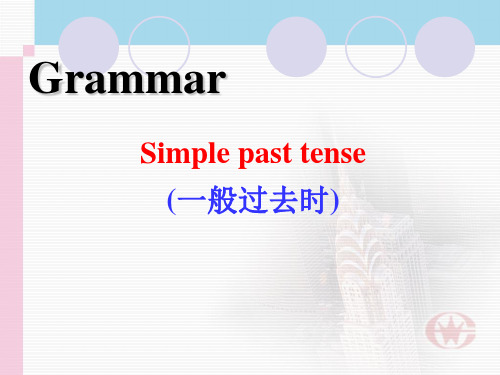
2 cry---- cried 3 carry--- carried 4 worry--- worried 5 study--- studied
末尾只有一个辅音字母的 末尾是“辅音字母
重读闭音节词,双写这个 +y”的动词
辅音字母后加 ed
变“y”为“i”加 ed
Group Five
Group Six
plan--- ppllaannnneedd drop--- ddrrooppppeded
不规则动词的过去式:
am, is --was are -- were do -- did go -- went have -- had see -- saw can -- could may -- might eat -- ate find -- found make -- made hear -- heard run -- ran take -- took
常与一般过去时态连用的时间有:
①yesterday, yesterday morning, the day before yesterday ②last night last week, last month, last year… ③two days ago, three years ago…
a moment ago=just now(刚才) ④in 1990, (in 1998…) ⑤this morning, this Monday ⑥When I was 5 years old
巧记不规则动词过去式
④过去式同原形:
cut(割)__put(放)____let(让)___ set(设置)______hit(击打)______ read(读)_/r_e_d_/ _ cost(花费)_____ hurt(伤害)____beat(战胜)_________
一般过去时2·
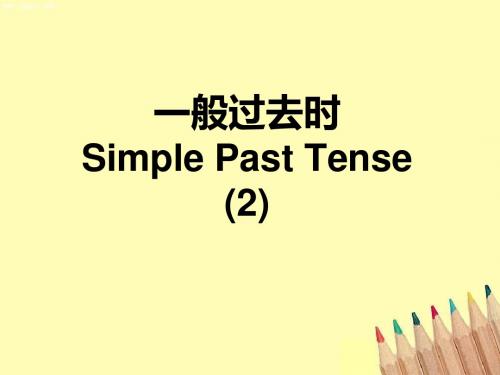
否定句
Fill in the blanks with the past forms.
1. My father _d_i_d_n_’t_g_o__(not go) to Shanghai last week. 2. I _d_id_n_’_t_b_u_y_(not buy) a book yesterday. 3. Chinese people _d_id_n_’_t _in_v_e_n_t(not invent) the bicycle in 1839. 4. They w__e_re_n_’_t (not be) at home just now.
特殊疑问句 (Wh-Questions)
我昨天踢足球了。 I played football yesterday.
Write down the sentences. 1.I went to the park last Sunday.
What did you do last Sunday?
2. Mary cleaned the room yesterday.
What did Mary do yesterday?
3. Chinese people invented paper and printing.
What did Chinese people do ?
7. I lent Sam my new bicycle yesterday.
I didn’t lend Sam my new bicycle yeserday
8. Lucy did her homework at home.
Lucy didn’t do her homework at home.
高中英语语法:动词的时态与语态

高中英语语法:动词的时态与语态We have meals three times a day.我们一日吃三餐。
(现在的习惯)He is always ready to help others.他总是乐于助人。
(现在的状态)When I was a boy, I often went to play in that park.我小时候常去那个公园玩。
(过去的习惯)1.一般现在时(1)一般现在时的构成一般现在时主要用动词的原形表示,如果主语为第三人称单数,则一般在动词原形后加s或-一般现在时除了可以表示现在的经常性、习惯性动作或存在的状态外,还可表示:①客观真理、科学事实及自然现象。
此用法即使出现在过去语境中,也用一般现在时。
The sun rises in the east.太阳从东方升起。
②用于here, there开头的倒装句中,一般现在时表示现在正在发生的动作或存在的状态。
There goes the bell.铃响了。
Here comes the bus.公共汽车来了。
2.一般过去时(1)一般过去时的构成(2)一般过去时的用法一般过去时除了可以表示过去经常性、习惯性的动作或存在的状态外,还有以下用法:①want, hope, think, intend等动词的一般过去时往往表示“过去原……”之意。
I thought he was an honest man.我原以为他是个老实人。
He didn't intend to hurt you.他本来没打算伤害你。
②wonder的一般过去时有时也可表示现在的行为,但口气要比用一般现在时更加委婉、客气。
I wondered if you could do me a favour.我不知道你能否帮我一个忙。
③used to+动词原形,表示过去的习惯性动作而现在已经不再发生了。
We used to spend our vacation in the mountains.我们以前常常在山里度假。
- 1、下载文档前请自行甄别文档内容的完整性,平台不提供额外的编辑、内容补充、找答案等附加服务。
- 2、"仅部分预览"的文档,不可在线预览部分如存在完整性等问题,可反馈申请退款(可完整预览的文档不适用该条件!)。
- 3、如文档侵犯您的权益,请联系客服反馈,我们会尽快为您处理(人工客服工作时间:9:00-18:30)。
EXERCISES 1 : NEGATIVE SENTENCES
I was a student. I wasn’t a student. She liked playing the piano. She didn’t like playing the piano. Tom did the homework in the evening. Tom didn’t do homework in the evening. They were my classmates. They weren’t my classmates. Mary bought this coat Mary didn’t buy this coat.
Bob and his parents didn’t go to the local museum yesterday.
Bob and his parents went to the local museum yesterday.
Did Bob and his parents go to the local museum yesterday? —No, they didn’t.
2. Who 做疑问词且当主语时,其语序是陈述语句。 既“疑问词+谓语+其他成分”。
e.g. Who told you this news? (区分: who did you go with?)
请用who, what, when, where对下列句中的各成分提问。
Tom played basketball in school last weekend who what
―YES/NO‖QUESTIONS IN SIMPLE PAST
TENSE
Be 动词:1)was/were 提前 2)如果主语是人称代词I/we, 则将其改成you,并把was 改成were.
Eg. ①I was at home yesterday. → Were you at home yesterday? ②They were happy last weekend. → Were they happy last weekend? 实意动词:1)最前面加did; 2)动词改成原形; 3)若主语是I/we, 改成you. Eg. ①He heard a sound. → Did he hear a sound? ②We went to the park last week. → Did you go to the park last week?
SIMPLE PAST TENSE Ⅱ
LEARNING OBJECTIVES
At the end of the class, you’ll be able to: have a better understanding of verbs in simple past form. make negative sentences in simple past tense. make ―YES/NO‖questions in simple past tense. make special questions in simple past tense.
Li Ping didn’t practice English with her
friend last weekend. Li Ping practiced English with her friend last weekend.
Did Li Ping practice English with her friend last weekend? —No, she didn’t.
ACTIVITY
Work in pairs,
1.
2.
Change the following sentences into statements or negatives. Change them into ―YES/NO‖ questions and give the answers according to the first sentence.
EXERCISES 2: ―YES/NO‖QUESTIONS
1. I was a student. Were you a student? 2. She liked playing the piano. Did she like playing the piano? 3. Tom did the homework in the evening. Did Tom do the homework in the evening? 4. They were my classmates. Were they your classmates? 5. Mary bought this coat. Did Mary buy this coat?
1. 2. 3. 4. 5.
Iwas am a student. She liked likes playing the piano. Tom does did the homework in the evening. They are my classmates. Marywere buys this coat. bought
Verbs ending in –e
+d
bake-baked, dance-danced, hope-hoped
study-studied, try-tried, carry-carried mop-mopped, drop-dropped
Verbs ending in a consonant +y
特殊疑问词 what(什么), when(什么时候), where(哪里), who(谁), How(怎样)
TWO KINDS OF SPECIAL QUESTIONS
1.What When ,where, how 作疑问词时, 其语序是:疑问词+一般疑问句。
e.g. what did you do last weekend? When did you go there? Where did they go ? How was your holiday?
I didn’t send a postcard to my friend in Tianjin a week ago.
Did you send a postcard to your friend in Tianjin a week ago? —Yes, I did.
SPECIAL QUESTIONS 以特殊疑问词开头,对句中某一成分提问的句子叫特 殊疑问句。
NEGATIVE SENTENCES IN SIMPLE PAST TENSE
Be 动词:后加 not was not → wasn’t ; were not → weren’t Eg. ①I was at home yesterday. → I was not/ wasn’t at home yesterday. ②They were happy last weekend. → They were not/ weren’t happy last weekend. 实意动词:1)动词前加did not; 2)动词变成原形。 did not → didn’t Eg. ①He heard a sound. → He did not/ didn’t hear a sound.
Rosalie and Nina chatted online in the winter holiday.
Rosalie and Nina didn’t chat online in the winter holiday.
Did Rosalie and Nina chat online in the winter holiday? —Yes, they did.
HOW TO ANSWER ―YES/NO‖QUESTIONS
Be 动词: 肯定回答:Subject +was/were. 否定回答: Subject +was/were not. Were you at home yesterday? → Yes, I was./ No, I was not. Were they happy last weekend? → Yes, they were./ No, they were not. 实意动词: 肯定回答:Subject +did. 否定回答:Subject +did not. Did he hear a sound? → Yes, he did./ No, he did not. Did you go to the park last week? → Yes, we did./No, we did not.
R2: WRITE DOWN VERBS IN SIMPLE PAST
TENSE
be —_____ Was/were did do —_____ go —_____ went came come—_____ played play —_____ studied study—_____ wanted want—_____ hope—_____ hoped
Tom had great fun last summer holiday.
Tom didn’t have great fun last summer holiday.
Did Tom have great fun last summer holiday? —Yes, he did.
I sent a postcard to my friend in Tianjin a week ago.
HOMEWORK
Finish the exercises in the textbook. Write your experience(经历) last weekend.
